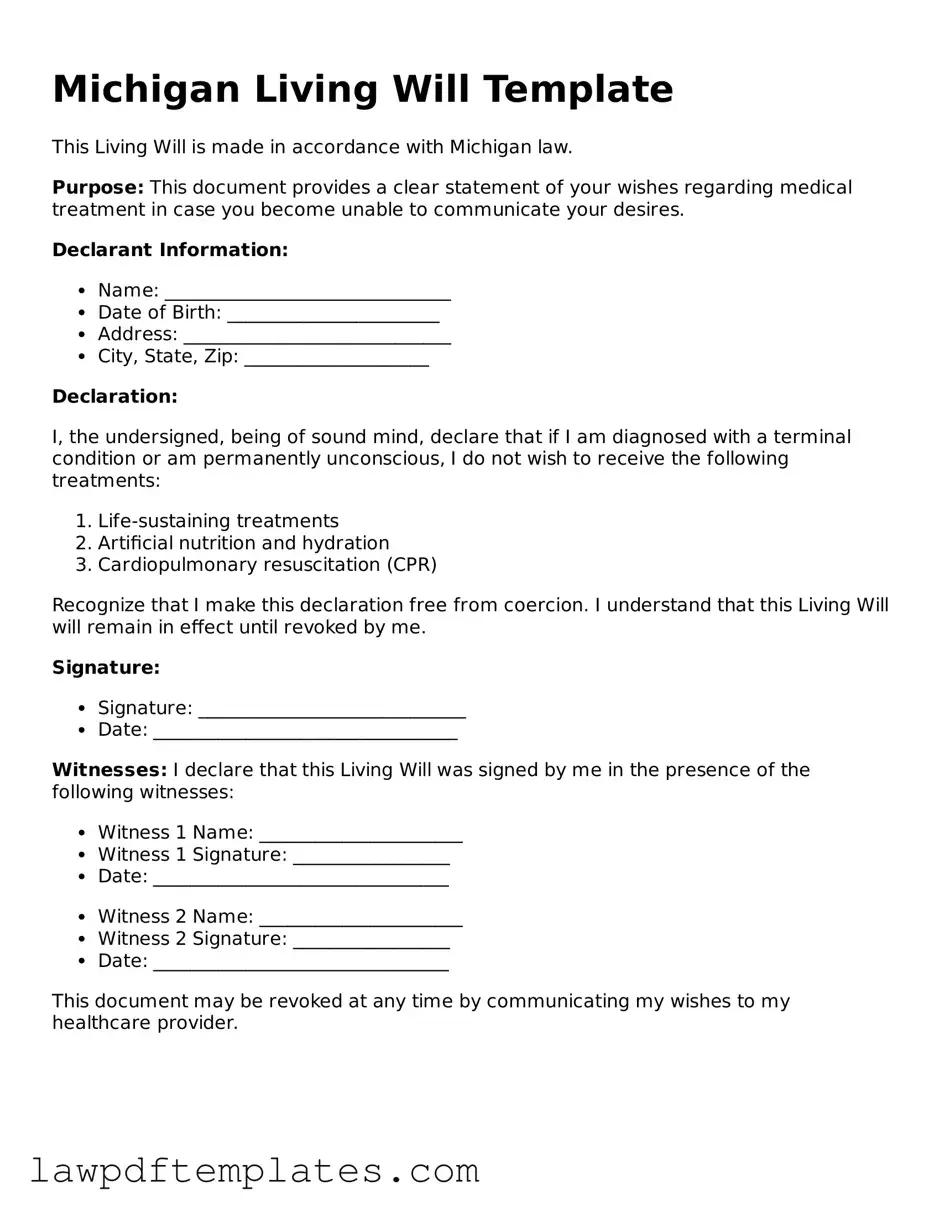Free Living Will Template for the State of Michigan
Form Breakdown
| Fact Name | Description |
|---|---|
| Definition | A Michigan Living Will is a legal document that outlines a person's wishes regarding medical treatment in the event they become unable to communicate those wishes. |
| Governing Law | The Michigan Living Will is governed by the Michigan Compiled Laws, specifically MCL 333.5651 through MCL 333.5658. |
| Eligibility | Any adult resident of Michigan can create a Living Will, provided they are of sound mind at the time of signing. |
| Witness Requirements | The document must be signed in the presence of two witnesses, who cannot be related to the individual or entitled to any portion of their estate. |
| Revocation | A Living Will can be revoked at any time by the individual, as long as they communicate their intent to revoke clearly. |
| Healthcare Proxy | While a Living Will expresses treatment preferences, individuals can also appoint a healthcare proxy to make decisions on their behalf. |
| Importance | Creating a Living Will is crucial for ensuring that medical decisions align with an individual’s values and wishes during critical times. |
Sample - Michigan Living Will Form
Michigan Living Will Template
This Living Will is made in accordance with Michigan law.
Purpose: This document provides a clear statement of your wishes regarding medical treatment in case you become unable to communicate your desires.
Declarant Information:
- Name: _______________________________
- Date of Birth: _______________________
- Address: _____________________________
- City, State, Zip: ____________________
Declaration:
I, the undersigned, being of sound mind, declare that if I am diagnosed with a terminal condition or am permanently unconscious, I do not wish to receive the following treatments:
- Life-sustaining treatments
- Artificial nutrition and hydration
- Cardiopulmonary resuscitation (CPR)
Recognize that I make this declaration free from coercion. I understand that this Living Will will remain in effect until revoked by me.
Signature:
- Signature: _____________________________
- Date: _________________________________
Witnesses: I declare that this Living Will was signed by me in the presence of the following witnesses:
- Witness 1 Name: ______________________
- Witness 1 Signature: _________________
- Date: ________________________________
- Witness 2 Name: ______________________
- Witness 2 Signature: _________________
- Date: ________________________________
This document may be revoked at any time by communicating my wishes to my healthcare provider.
Common mistakes
Filling out a Michigan Living Will form can be a crucial step in ensuring that your healthcare wishes are respected. However, many individuals make common mistakes that can lead to confusion or even invalidate their directives. Understanding these pitfalls can help ensure that your intentions are clear and legally binding.
One frequent mistake is failing to specify the types of medical treatments one does or does not want. A Living Will should clearly outline preferences regarding life-sustaining treatments, such as resuscitation or mechanical ventilation. Without these details, healthcare providers may struggle to interpret your wishes, leading to unwanted interventions.
Another common error is neglecting to sign and date the document. A Living Will must be signed by the individual creating it to be considered valid. Additionally, dating the form is essential, as it indicates when the wishes were articulated. Without a signature or date, the document may not hold up in a medical setting.
Many people also forget to have witnesses sign the form. In Michigan, the law requires that the Living Will be signed in the presence of at least two witnesses. These witnesses must be adults who are not related to the individual and do not stand to gain anything from the individual's estate. Failing to have the required witnesses can render the document ineffective.
Some individuals make the mistake of using vague language. Phrases like "do everything possible" can lead to ambiguity. It is crucial to use clear and specific language to convey your wishes. For example, stating "I do not want to be placed on a ventilator" is more effective than a general statement about life support.
Another error involves not reviewing the document periodically. Life circumstances and preferences can change over time. Regularly reviewing and updating your Living Will ensures that it reflects your current wishes and remains relevant. Neglecting this step can lead to outdated directives being followed.
Additionally, people often overlook the importance of discussing their wishes with family members. A Living Will may be legally binding, but having open conversations with loved ones can help prevent misunderstandings during difficult times. When family members are informed about your wishes, they can advocate for you more effectively.
Lastly, some individuals mistakenly believe that a Living Will is the same as a Durable Power of Attorney for Healthcare. While both documents address healthcare decisions, they serve different purposes. A Living Will outlines specific wishes regarding medical treatment, while a Durable Power of Attorney designates someone to make healthcare decisions on your behalf if you are unable to do so. Confusing the two can lead to gaps in your healthcare planning.
Discover More Living Will Templates for Specific States
Nc Living Will Form - Living Wills are often part of larger estate planning documents but can stand alone.
Utilizing the Virginia Motor Vehicle Bill of Sale form is essential for anyone looking to buy or sell a vehicle in Virginia. This legal document not only confirms the sale and transfer of ownership but also protects both parties involved. For a comprehensive understanding and to obtain the necessary documentation, visit PDF Documents Hub for more information.
Georgia Living Will - A Living Will allows you to set limits on the extent of medical interventions you’re willing to accept.
Living Will Template California - You can use the form to decline certain medical procedures in specific situations.
Living Will Arizona - Understanding how to complete a Living Will can lead to a more informed and empowered decision-making process.
